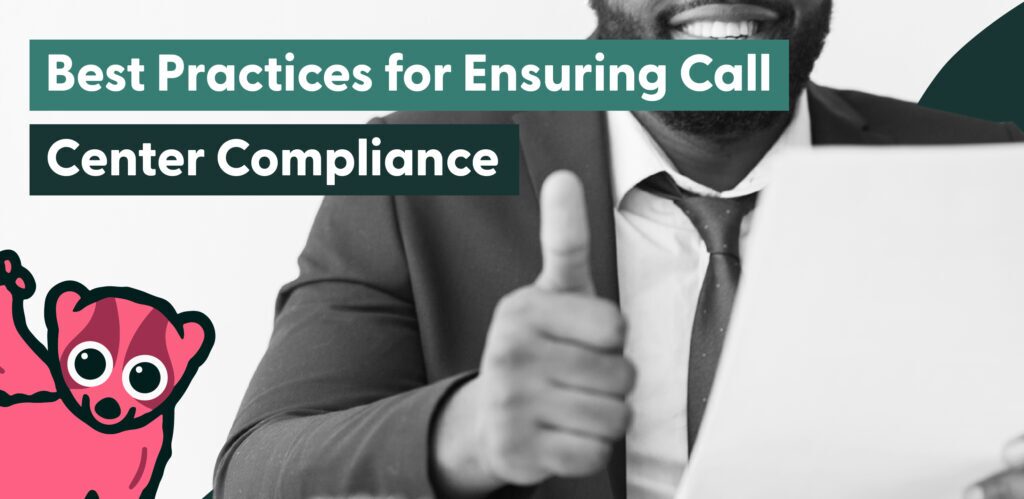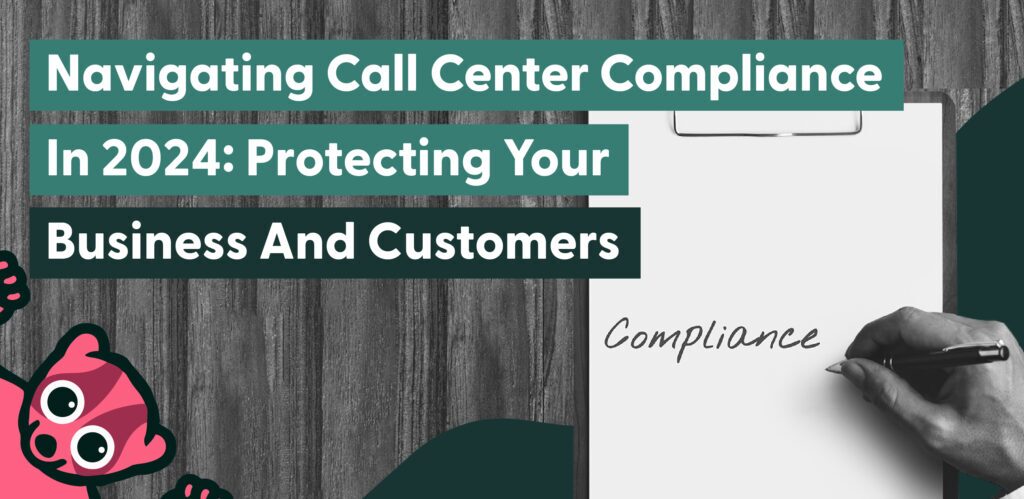
Failing to follow the rules and regulations required of call centers can have serious consequences for your business. Non-compliance puts you at risk of:
❌ Costly lawsuits and fines.
❌ Negative publicity.
❌ Loss of customers.
❌ Halted operations.
For instance, businesses that don’t comply with Payment Card Industry (PCI) security standards can face fines as high as $100,000. And for severe violations of Europe’s General Data Protection Regulation (GDPR) Act, fines can be up to $20 million Euro or 4% of revenue!
To protect your call center from these risks, it’s essential to comply with laws and regulations.
This article explores the key regulations governing call centers and offers best practices to help you stay compliant.
What Is Call Center Compliance?
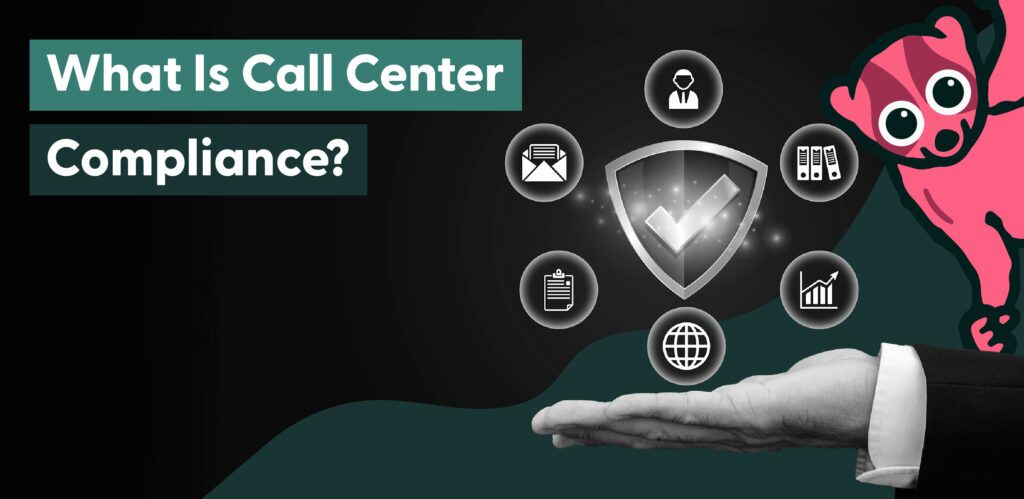
Call center compliance refers to a set of laws, regulations, guidelines, and best practices that contact centers must follow to ensure they operate within legal and ethical boundaries. The rules are in place to protect both your company and your customers.
Compliance rules govern the operations of call centers, ensuring they maintain fair and transparent communication practices and protect sensitive customer information.
Failure to comply with these regulations can result in hefty fines, lawsuits, and damage to your company’s reputation. Maintaining compliance is not only a legal obligation but also a vital component of customer trust and business integrity.
Why Is Call Center Compliance Important?
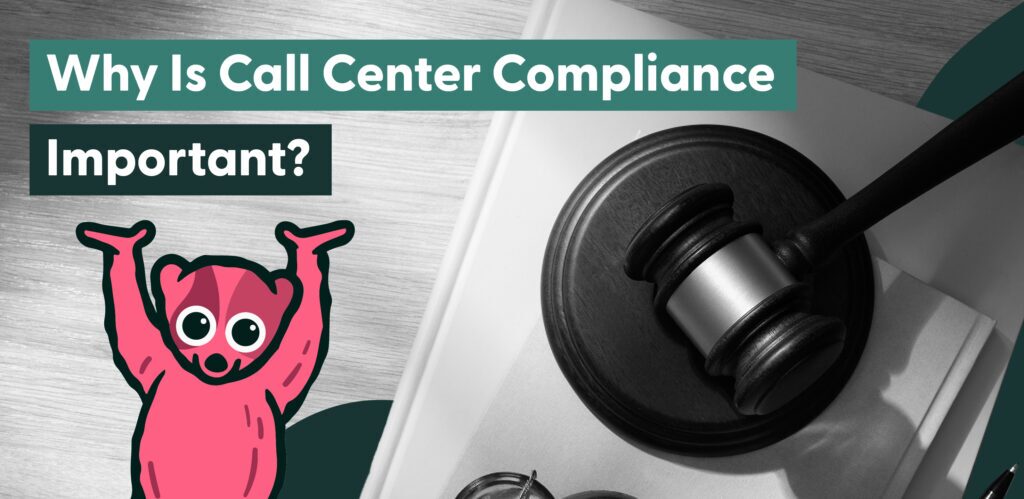
Now that you know what call center compliance is, let’s look at what could happen if you don’t follow the laws and regulations that govern your operations:
⚠️ Penalties, fines, and legal action
Regulatory authorities can impose substantial fines and penalties if your call center violates a law or regulation, which can lead to significant financial loss for your business.
Here are some examples of what happens when the rules are broken:
DirecTV
DirecTV violated the Telephone Consumer Protection Act (TCPA) by directing debt collection companies to make unwanted telemarketing calls to consumers on their behalf.
DirecTV hired 20 different debt collection companies to call over seven million customers. The company had to agree to a $17 million settlement and then faced massive legal liabilities for multiple TCPA-related lawsuits.
Dish Network
The Federal Trade Commission (FTC) fined Dish Network $280 million (excluding legal fees) for calling potential customers listed on the Do Not Call (DNC) registry, violating people’s privacy, and breaking the law. The FTC found that Dish Network knew it was violating the DNC law.
⚠️ Negative publicity and reputational damage
You’ve worked hard to build a good reputation for your brand. But if you’re fined or face a lawsuit for non-compliance, you’ll likely garner negative publicity, which could damage your reputation.
⚠️ Increased customer dissatisfaction
If you violate customer rights and their privacy, they may become unhappy with your business and potentially even lodge complaints against you with regulatory authorities.
⚠️ Loss of customer loyalty and trust
Non-compliance could damage customers’ trust in your business and their loyalty to your brand if they discover that you have been disregarding ethical standards or their rights.
⚠️ Halted call center operations
Regulatory violations can result in call center shutdowns, resulting in revenue loss, business disruption, and poor employee morale.
What Compliance Rules Must Call Centers Follow?
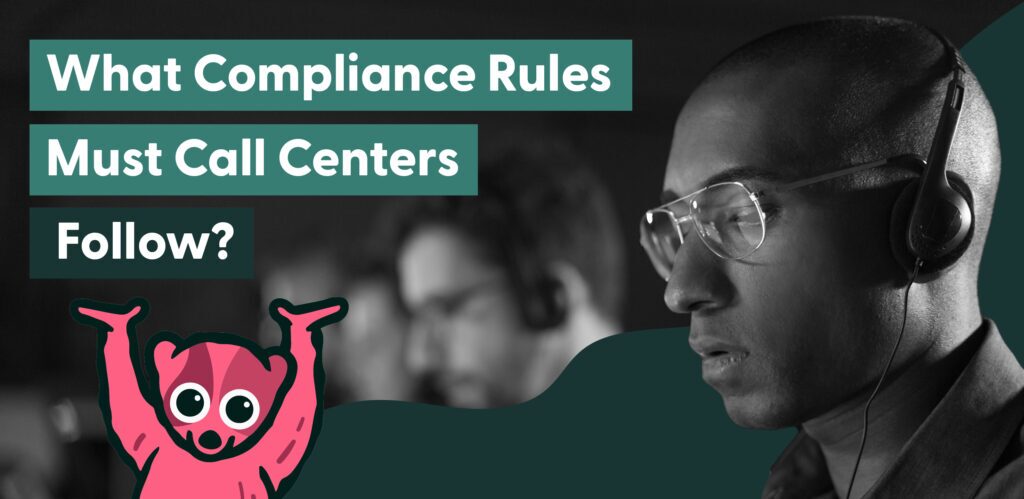
Below are eight of the most important standards for contact center compliance and how you can follow them:
1. Payment Card Industry Data Security Standard (PCI DSS)
PCI DSS is designed to ensure businesses protect sensitive payment card details during any payment transaction. It prevents call centers from being able to record and store card information.
Only 36% of companies are in full compliance with PCI DSS. To ensure you’re one of these businesses, follow these steps:
➡️ Encrypt sensitive customer data: Call centers should ensure that any credit card information they handle is encrypted. This includes using secure communication channels when transmitting card data and encrypting stored data to prevent unauthorized access or data breaches.
➡️ Limit data access: Only authorized employees should have access to cardholder information. Call centers must implement role-based access controls to ensure that employees can only access the data they need to perform their job functions.
➡️ Mask card data: Contact centers should ensure that sensitive card information is masked when displayed on screens or printed documents so that only the last four digits of the card number are displayed. This prevents unauthorized individuals from viewing full credit card details.
2. General Data Protection Regulation (GDPR)
GDPR applies to any company operating within the European Union or handling the personal data of EU citizens globally. It requires call centers to get consent from their customers before recording calls and to provide a legitimate reason for call recording. Currently, only 59% of businesses meet GDPR requirements.
To meet GDPR requirements in your call center, you should implement the following:
➡️ Obtain record of explicit consent: Call centers must obtain explicit consent from customers before processing any personal data. This includes clearly informing customers how their data will be used and allowing them to opt out anytime.
➡️ Data minimization: Call centers should only collect and process data that is strictly necessary for the intended purpose. Avoid collecting excessive data that isn’t required for the specific service provided.
➡️ Secure data storage and transmission: Personal data must be protected using encryption methods, and call centers should ensure it is securely transmitted over the internet.
3. Call Recording and Monitoring Consent
Thirty-nine states and the District of Columbia have statutes requiring at least one party to consent to monitoring or recording a call, while 11 states require both parties to consent.
California recognizes implied consent if the recording is announced at the beginning of the call and the other party has provided express consent.
To comply with the call recording and monitoring consent regulation, contact centers should use the following:
➡️ Pre-recorded messages: A message played before customer interactions begin, notifying them that the call is being recorded and monitored.
➡️ Live agent notification: Agents should notify the customer if the call will be recorded, allowing them to continue or opt out.
4. Do Not Call Registry (DNC)
The DNC is a list of phone numbers where people can register to opt out of receiving unsolicited telemarketing calls. The DNC registry came into effect in 2003, making it illegal for most telemarketers or sellers to call a number on the list.
Below is how your call center can avoid the penalties associated with DNC regulations:
➡️ Register with the national DNC registry: U.S. call centers must register with the FTC’s national DNC registry. After registration, they can access the list of numbers that are off-limits for telemarketing calls.
➡️ Regularly update DNC lists: Contact centers should update their internal DNC list frequently, at least every 31 days, to ensure they don’t contact people on the registry.
5. The Telephone Consumer Protection Act (TCPA)
The TCPA is a federal law in the U.S. that regulates telemarketing calls and the use of pre-recorded messages. It aims to protect consumers from unwanted sales calls.
However, not all call centers comply with this act. In fact, in just one year, there were more than 2,300 lawsuits for violations of the TCPA.
Here’s how you can ensure your contact center follows the TCPA compliance regulations:
➡️ Obtain prior express consent: Before making any marketing call, contact centers must obtain the customer’s express consent to receive calls or messages.
➡️ Get written consent for robocalls: Call centers must have the consumer’s express written consent for automated marketing calls or texts. This consent should be clear and unambiguous.
6. The Telemarketing Sales Rule (TSR)
The TSR is a regulation enforced by the FTC in the U.S. to protect consumers from deceptive or abusive telemarketing practices. It sets guidelines for telemarketing calls and applies to both inbound and outbound sales calls. Failure to adhere to the TSR could lead to fines of up to $43,000 for each offense.
To adhere to the TSR, follow the below steps:
➡️ Provide full identification: Telemarketers must clearly identify themselves, the company they represent, and the purpose of the call at the beginning of the interaction.
➡️ Avoid false claims: Call centers must avoid making false or misleading representations about a product or service’s cost, terms, or conditions.
➡️ Check DNC lists: Contact centers must check their national DNC and remove any numbers listed before making telemarketing calls.
7. The Fair Debt Collection Practices Act (FDCPA)
The FDCPA is a U.S. federal law enacted in 1977 that regulates the practices of debt collectors, including call centers. The main goal is to protect consumers from abusive, unfair, or deceptive practices when businesses attempt to collect debt.
To comply with the FDCPA, call centers should:
➡️ Train employees on FDCPA requirements: All your agents handling debt collection should be trained thoroughly on the regulations, including understanding all legal definitions.
➡️ Avoid harassment or abuse: Call centers must ensure they don’t engage in practices that could be considered harassment, such as repeated calls intending to annoy or use abusive language.
➡️ Provide accurate and honest information: When discussing debt, call center agents must provide accurate information about the amount owed. They can’t misrepresent themselves, the debt, or legal actions.
8. The Health Insurance Portability and Accountability Act (HIPAA)
HIPAA is a U.S. law designed to protect the privacy and security of patients’ health information.
HIPAA sets strict guidelines for call centers, particularly those handling healthcare-related matters, regarding the handling of Protected Health Information (PHI). This includes any identifiable health data such as medical records, billing information, or patient history.
Currently, up to 70% of businesses aren’t HIPPA-compliant. To avoid being one of these businesses, follow these best practices in your call center:
➡️ Administrative safeguards: Call centers must establish internal policies and procedures to limit access to PHI. This includes appointing a privacy officer, developing data security policies, and ensuring regular employee training.
➡️ Physical safeguards: PHI must be stored in secure locations, and physical controls such as locked rooms for data storage or security systems for computer access should be implemented.
➡️ Technical safeguards: Contact centers must protect electronic PHI using encryption, secure networks, and firewalls.
Like what you’re reading? Get the latest news and product updates delivered to you in our newsletter.
Best Practices for Ensuring Call Center Compliance
You now know the main rules and regulations you must follow in your call center. Let’s unpack how to maintain compliance at all times:
✅ Develop a compliance policy
Create and enforce a strict and comprehensive compliance policy that can easily be accessed by your contact center staff. This policy should set guidelines for agents to follow. The policy should include:
1. The importance of maintaining compliance
Emphasize the significance of maintaining compliance in your call center. Your policy should outline how non-compliance can lead to severe financial penalties, legal actions, and loss of customer trust.
2. Applicable laws and regulations
Outline the relevant laws and regulations your call center agents should follow when contacting and interacting with customers.
3. Procedures for obtaining, handling, and storing sensitive data
Define how sensitive customer data, such as personal and financial information, should be collected and managed. This could include guidelines for limiting access to sensitive data to authorized employees only.
6. Guidelines for recording and monitoring customer interactions
Establish clear call recording and monitoring rules, including how agents must ensure one- or two-party consent before recording customer calls.
7. Procedures for addressing data breaches and security incidents
Detail the steps for handling data breaches, including how and when affected customers and regulatory bodies should be notified. Outline your internal procedures for investigating and addressing breaches, including:
🔒 Securing data.
🔒 Assessing the impact.
🔒 Taking corrective actions.
6. Consequences of violating your compliance policy
Define the consequences for employees who violate your compliance policy. Depending on the severity of the violation, this may include warnings, retraining, suspension, or termination.
✅ Provide ongoing training for call center agents
You should provide your agents with ongoing compliance training and coaching to ensure they are familiar with your policy and the laws and regulations governing your call center.
They should understand exactly how to handle customer interactions and gather and process sensitive information to ensure compliance.
✅ Follow call center scripts
Using scripts can help you maintain compliance during customer interactions. Scripts are pre-written responses and guidelines that agents can use to navigate conversations, which is especially important during outbound calls. To make this even easier, you can build these into macros or an agent guidance tool like Loris CoPilot.
✅ Use compliance call center software
You should use call center compliance software, especially if you are running an outbound operation where agents make calls and use auto dialer software. This will ensure you comply with regulations that your auto dialer systems support DNC compliance.
This software typically includes features such as:
👉 Call recording and real-time monitoring.
👉 Call script management.
👉 Data encryption.
✅ Ensure regular compliance monitoring
All the industry regulations mentioned earlier in this article are subject to changes and updates. For this reason, your call center managers need to regularly and consistently monitor changes in compliance requirements and adjust accordingly.
✅ Understand which calls have a Reason to Review
Within the Loris conversation intelligence platform, Reasons to Review feature flags conversations based on important issues for you to review.
Reasons to Review are significant negative and positive conversation makers that warrant your attention, like Escalating to a manager, Profanity, Complaints, or threatening to take regulatory action. Unlike Contact Drivers which show customer intent, these don’t appear in every interaction but instead are other signals you need to be aware of, whether for agent performance, reducing churn risk, or maintaining regulatory compliance.
Ensure Call Center Compliance with Conversation Intelligence
If you fail to comply with the laws and regulations that govern call center operations, you could face lawsuits, massive fines, dissatisfied customers, and halted operations. If this isn’t a disaster, we don’t know what is!
With the help of an AI conversation intelligence platform like Loris, you can ensure your call center remains compliant. Our platform analyzes every customer interaction in your call center and can classify interactions based on important issues that need to be reviewed.
We tailor our Reasons to Review feature to each client’s needs, and it’s especially useful if you’re in an industry with strict regulatory requirements like the need to record every customer complaint. The feature signals if a conversation is headed in a worse-than-average direction, which is helpful for post-interaction reviews by giving you a list of the conversations that need your attention.
Schedule a meeting with the Loris team today to find out how our robust platform can help you maintain a compliant call center and avoid the consequences of non-compliance.
